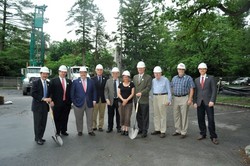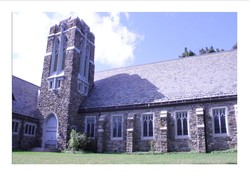How do a couple of old boilers start an environmental movement and so much more?
In the case of Huguenot Memorial Church in Pelham Manor, N.Y., they break down. Again.
After its decades-old heating system finally collapsed, Huguenot decided to install a geothermal system, using the earth’s energy to heat and cool its campus. That plan has since morphed into a project called Sustainable Huguenot, an ongoing plan to create a financially and environmentally responsible church for generations to come.
Huguenot Church was founded in 1876 and built its current sanctuary in 1917. Through the years the church has expanded to 34,000 square feet by adding offices, classrooms and a gym.
“It’s all one facility but the original heating goes back to the ’20s and it was at that time a coal-fired steam system that was converted to oil in the ’30s,” said Eric Smith, chair of the church’s building and grounds committee.
Time and disrepair eventually meant that when one part of the church needed heating, the entire system came on. With the increasing cost of oil, this meant that Huguenot was spending about $100,000 a year on heating.
Only a few areas of the building had air conditioning, meaning that the church wasn’t able to offer summer programs. In addition, because of the system’s inability to control temperature and humidity in the sanctuary, the church organ had deteriorated beyond repair.
The final push came when the system began to decline to the point of leaky steam pipes and broken boilers.
Something had to be done, so the church began to research its options.
“The goal was to figure out how on earth we heat and cool our building in a way that’s sustainable because the current two-boiler system was not,” said the Rev. Jacob Bolton, associate pastor.
Huguenot could either continue to make repairs to its old system or take a big step and envision something completely new.
A task force considered a number of options, from a basic hot-water heating and chiller AC system to air-to-heat pumps. But both projects had flaws, including intrusiveness, expense and lower-than-desired efficiency rates.
The task force then discussed a geothermal system, which has been used by other faith-based institutions, including New York’s General Theological Seminary.
“It uses the earth’s energy,” Smith said. “All the equipment is brought indoors, there’s no exterior heat or noise or aesthetics compromises and it also is the most efficient system.”
Huguenot will dig 27 wells to tap the earth’s geothermal energy, which will be used to heat and cool the campus. The new system will be cleaner and much more environmentally friendly than the old system.
“Environmentally, once the project is done, we will rely no more at all on oil to heat and cool the church,” Bolton said. “I like to think of it almost as a peacemaking movement because the never-ending search for oil, we will be removing ourselves from that almost entirely by gathering our own energy from the heat of the earth.”

The groundbreaking ceremony for the geothermal system was May 30. With the new system, “We can be the church as opposed to being the people who get together and hope that our boiler works,” said the Rev. Jacob Bolton, associate pastor. —courtesy of Huguenot Memorial Church
At $2-3 million, the geothermal system was the most expensive option. But with an expected 50 percent reduction in utility costs, the church thought it was a good investment. Huguenot hopes to recoup installation costs in about 15 years. The church is in the process of a three-year capital campaign and has taken out a loan from the Presbyterian Investment and Loan Program.
“Every year moving forward, we will have estimated $100,000 we don’t have to devote to [heating oil]. We can do something else with that, [like] mission or Christian education,” Bolton said. “Not only will we have made our money back, we also have more money to do things with, we can be the resurrection in the world. We can be the church as opposed to being the people who get together and hope that our boiler works.”
That realization turned the project from building repair to something more.
“As we decided to tackle this, it became clear that the environmental aspect was not just in our heating system but could be in our whole approach to running the church,” Smith said.
Sustainable Huguenot, the church’s long-term plan for financial and environmental responsibility, will serve the church for generations to come.
The official groundbreaking for the new geothermal heating system was May 30, and Huguenot hopes to have it completed and functioning by October.
Toni Montgomery is a freelance writer in Statesville, NC, where she is also secretary for First Presbyterian Church.

